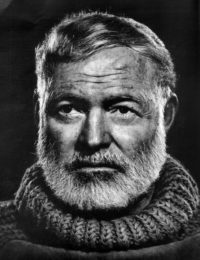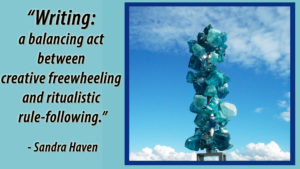How Hemingway and Stephen King’s Advice Fail Us

Should you — or should you not — take the sage advice of Hemingway? Or Stephen King? Or of any great writer for that matter?
I enjoy dipping into quotations from best-selling authors. I add their quotations to photographs and post them on my website. I want to believe I can snatch the seeds of literary wisdom from a famous writer and it will blossom my writing into a full bloom success.
But … then I wonder: “If this is so brilliant, why isn’t it working for me and for every writer who repeats the quote?”
Different Strokes
Ernest Hemingway offered this advice:
“The best way is always to stop when you are going good and when you know what will happen next. If you do that every day when you are writing a novel you will never be stuck.”
Hemingway’s point was that it isn’t the word count or the time you clock that matters. It is keeping your momentum. By always stopping when you still have creative juices flowing, you can get into the next day’s writing quickly.
I can see this helping some writers with writer’s block. But not every writer.
Personally, I write until I’m spent. If I don’t, my brain goes over and over my next scene, the next wording, while I cook dinner or try to act like a normal person in front of others (which seldom works!). “Memorize that line!” my brain shouts inside, hoping I can recall it the next time I get to my computer. (I never can!)
So I write until I have nothing left for that day or session. Only then can my mind relax, relieved, and satisfied. Am I stuck in the morning because of that? I haven’t been yet. Maybe not everyone needs to follow every bit of advice offered by famous writers.
Oversimplification
Stephen King wrote a popular book, “On Writing.” In it, he states:
“The road to hell is paved with adverbs.”
Well, there is nothing wrong with adverbs. It is their wide-spread overuse or misuse that King finds appalling, as do many. Yet other writers, like Dick Francis, uses them frequently—and with 40+ books and a world full of fans adverbs haven’t hurt his career.
Oversimplified statements can confuse and mislead new writers.
Why are famous writers’ quotations frequently contradictory or confusing? Sometimes just plain wrong? There are a couple reasons.
1. Memorable Advice May Not be Accurate
One reason quotations can’t be trusted is that the “greats” are really good at manipulating words. They can twist a simple concept into a “Wow!” quotation. I mean, they ARE good writers! They skillfully create memorable quotations using allegories or simplification which can’t be taken at face value. Hemingway once said,
“There is nothing to writing. All you do is sit down at a typewriter and bleed.”
Well, certainly that’s a memorable quote, but you need to understand he meant to pour your emotions into your writing and not to make a bloody mess of your manuscript.
2. The Writing Climate Changes
The second reason quotations can be confusing is that, being all-too-human, even the best writers have their good and bad days. Days when their writing is going well and they can quit in mid-stride (Hemingway’s first quote), confident to be ready for the next day. And days when they feel like they are bleeding their lives onto paper and getting nowhere.
Rather like the rest of us mere mortal writers, they have mood swings and their famous writing quotations can fluctuate with the weathervane of their writing.
What’s a Writer to Do?
Read all the quotes you want, nod at some, and laugh at others. Stick them on photos, paste them under your computer screen, pin them up on your bulletin board.
Then set them all aside as you find your own path.
Good writing takes these things:
- learning the basics
- practicing the craft
- writing consistently
- focusing on your niche
- and being perseverant
Will there be stumbling blocks and detours along the way? Sure.
Will there be methods to try and discard? Yep.
Is there that magic bullet that will make all this easy? Nope (drats!)
But you WILL figure it out. Listen to your own heart because, in the end, you will find what works best for your own writing needs.
Want another quote to add to your list? Here’s mine for the day:

Have a Favorite Quote?
What’s your favorite writing quote? Share it in the comments!
Want personal help with your writing project?
Contact me directly with an email and let’s discuss YOUR book project!






